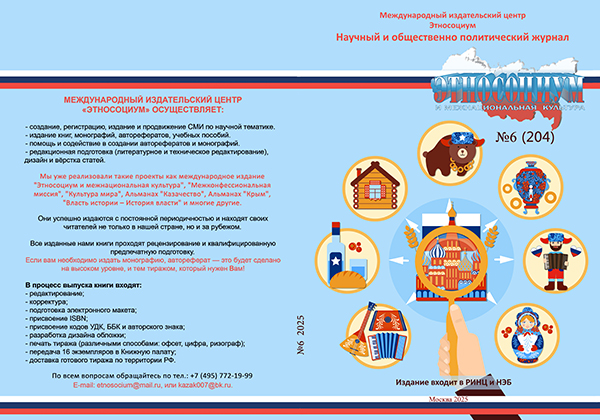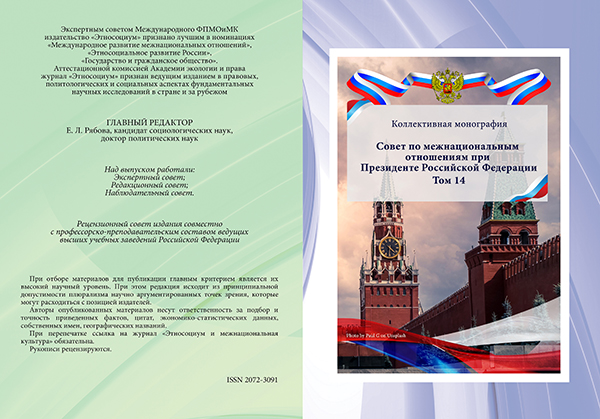

Content
|
COUNCIL ON INTERETHNIC RELATIONS UNDER THE PRESIDENT OF THE RUSSIAN FEDERATION
|
|
|
Ryabova E.L., Ternovaya L.O. Border guards: vocation and profession
|
9
|
|
CURRENT PROBLEMS OF MODERN SOCIETY
|
|
|
Karapetyan T.Sh. Digital media and communication risk management in the national security system of the country
|
19
|
|
Terekhova A.S. Artificial intelligence and NFT: transforming art markets and re-thinking artistic expression
|
29
|
|
Strizhova E.V., Lobanova E.I. The language code of influence: a linguistic analysis of soft power strategies in the Russian political space
|
45
|
|
Polozhentseva I.V., Baksheev A.I., Tagibova A.A. Developing individual abilities of gifted youth in a digital educational environment
|
52
|
|
REGIONAL RESEARCH
|
|
|
Petrukhin K.Yu. Expert opinions (journal publications, based on historical experience) on the reintegration of new regions into Russia
|
61
|
|
REGIONAL RESEARCH
|
|
|
Filippov V.R. Ivory Coast: French military base liquidated
|
70
|
|
Aibibula Kadier Ethnic interaction in public cultural space and the sense of Chinese national community: an analysis based on the ethnographic investigation of square dancing
|
82
|
|
JURISPRUDENCE
|
|
|
Tyschenko E.O. Domain name disputes and the procedure for their resolution
|
99
|
|
Abstracts
|
108
|
|
Authors
|
119
|
|
Requirements to materials submitted to the international publishing house "Etnosocium"
|
121
|
The article is devoted to the analysis of the specifics of the border guard profession, which belongs to old spheres of activity and is associated with the formation of early medieval states, when the boundaries of possessions began to be more clearly defined and new threats from nomads appeared, which required the protection of borders. It is noted that initially the border guard was characterized by both high combat qualities and unique psychological characteristics, among which observation, endurance, analytical abilities stood out. All these qualities retain their significance now, despite the fact that the modern border service is becoming more technologically equipped.
Key words: history, state, border, border service, border security, borderology, limology, border research.
The article examines the role of digital media in the national security system, with an emphasis on the specifics of communication risks arising in the digital environment. The sources and forms of these risks are analyzed, as well as mechanisms and approaches to their neutralization in the context of strategic information security management. Special attention is paid to the threats associated with the spread of disinformation, manipulative influence and vulnerability of cyberspace. It is concluded that it is necessary to form a comprehensive public policy that combines regulatory, technical and educational measures to manage communication threats in a digital society.
Key words: digital media, communication risks, information security, national security, media literacy, information stability.
The convergence of artificial intelligence and non-fungible tokens (NFT) technologies has initiated a fundamental transformation of art markets and creative expression practices. This study analyzes the multifaceted interaction between algorithmic content generation systems and the blockchain infrastructure of digital asset tokenization, revealing structural changes in the art market economy, modification of institutional mechanisms for legitimization and valorization of works of art, as well as the evolution of aesthetic paradigms. The methodological basis of the study integrates a quantitative analysis of transaction data from leading NFT platforms (n=6), a qualitative study of the practices of 237 artists working with AI tools, and expert interviews with representatives of art institutions (n=42). The results demonstrate a significant correlation (r=0.78, p<0.001) between the degree of algorithmic complexity of AI systems and the market capitalization of NFT works, revealing the dynamics of diversification of artistic practices with a decrease in entry barriers for participants in the creative industries by 63.7%. The formation of new models of distribution of economic value is established, characterized by a shift from traditional intermediary structures to decentralized protocols with a 41.9% increase in direct income of artists. Transformational processes in the field of authorship, authenticity and originality of works are identified, accompanied by institutional recognition of generative practices. The obtained data indicate the prospects for the formation of hybrid ecosystems of creativity that combine human intelligence, algorithmic systems and decentralized mechanisms of authentication and distribution.
Key words: artificial intelligence, non-fungible tokens, blockchain tech-nologies, digital art, generative systems, asset tokenization, cryptoeconomics.
The article is devoted to the analysis of the use of foreign words in modern Russian as a tool of "soft power" in order to exert political influence. Examples from Russian media, news portals, TV shows and other publications are considered, showing how Anglicisms and other borrowings are used to form a certain worldview, promote political ideas and manipulate public opinion. Special attention is paid to the strategies of using foreign words in the context of political discourse within the framework of linguistic analysis, and their impact on cultural identity.
Key words: foreign words, Anglicisms, soft power, political discourse, mass media, propaganda, language policy, cultural identity, manipulation, language intervention, linguistic analysis, semantics, pragmatics, discursive analysis.
The article examines the possibilities of using modern technologies, applications, and artificial intelligence to teach gifted youth. Particular attention is paid to how these tools contribute to the development of individual abilities of pupils/students, providing them with access to personalized educational resources, adaptive curricula, and interactive platforms. The authors analyze the benefits of using technologies to support creative thinking, flexibility in the educational process, and the development of independent knowledge search skills. Innovative approaches to using artificial intelligence to create an environment that meets the needs of gifted young people are also explored.
Key words: gifted youth, digital educational environment, innovation, interactivity, artificial intelligence.
In the context of complex geopolitical processes related to the entry of new regions into the Russian Federation, the analysis of historical experience and opinions of leading experts in the field of state reintegration is of particular importance. The article examines scientific approaches and publications on the adaptation of Crimea and other territories that joined Russia in different periods. Special attention paid to the practical conclusions drawn from these studies, as well as the possibilities of their application in the integration of the Donetsk and Lugansk People's Republics, Zaporizhia and Kherson regions. Based on the analysis of literary sources, conclusions formulated about the most effective mechanisms of legal, social and cultural adaptation that ensure stability and stability in the new subjects of the Federation.
Key words: reintegration, Crimea, DPR, LPR, Zaporizhia region, Kherson region, historical experience, post-conflict reconstruction, regional policy of Russia.
The study of the interaction of sovereign African states with the so-called “great powers” is particularly relevant in the context of the rapid change in the geopolitical and geostrategic landscape of the African continent in the last decade. The “return” of Russia to Africa, the rapid conquest of African markets by China, the emergence of new strong players in the African field of political, economic, and geostrategic activity require an in-depth study of the dynamics of the foreign policy of African countries. The purpose of this study is to identify the reasons that prompted the governments of the Republic of Côte d'Ivoire and the French Republic to reach an agreement and implement in political practice an agreement on the transfer of the French military base in Port-Bouet to the jurisdiction of the African country. The object of the study was the latent relations of the political elites of the two countries in the conditions of a deep crisis in the African policy of the Fifth Republic during the presidential rule of E. Macron. In the conditions of informational non-obviousness of the processes under consideration, the main source was the materials of the French media. Their study led to the use of the ideographic method of data analysis. The study showed that President Alassane Ouattara was forced to liquidate the French military base out of fear of the growing anti-French sentiments of the Ivorians, and President Emmanuel Macron was forced to do so out of fear of finally ruining relations with a country that was once friendly to France.
Key words: Côte d'Ivoire, France, Port-Bouet military base, Alassane Ouattara, Emmanuel Macron, French African policy, Franco-Ivorian relations.
Taking the square dancing in Southern Park, Urumqi, Xinjiang as the research object, the paper uses the ethnographic method to explore the internal relationship between ethnic interaction and fostering the sense of Chinese national community in the public cultural space. The research reveals that square dancing ,as a public cultural practice characterized by collectivity, openness, and cultural inclusivity , facilitates the breakdown of interethnic barriers through physical interaction via the three-dimensional framework of "behavior-meaning-identity". This process fosters emotional resonance and social capital among multi-ethnic participants via bodily interaction, enabling relational transformation from "strangers" to "kin-like acquaintances." . Its latent functions manifest in spontaneously promoting cross-ethnic engagement, constructing a shared spiritual home for all ethnic groups through cultural fusion of attire, music, and choreography, and nurturing an aesthetic community and identity recognition aligned with the "diversity-in-unity" paradigm. The study concludes that square dancing, operating as a grassroots, life-integrated pathway, transfigures physical space into a domain of cultural identification. Through embodied practice, it actualizes a transition from "cultural acquisition" to "emotional resonance" and ultimately "identity affirmation," offering a folk-informed practical paradigm and theoretical model for fostering the sense of Chinese national community. This underscores the pivotal value of integrating explicit education with implicit cultural inculcation.
Key words: mass dances, interethnic communication and integration, community consciousness of the Chinese nation, ethnic culture, ethnic music.
In the context of economic digitalization and the rapid development of the online environment, domain names are gaining importance as means of individualization. Against this backdrop, the number of domain name disputes is increasing, which highlights the relevance and practical significance of the chosen topic. Despite the presence of active judicial practice, Russian legislation still lacks a clear definition of domain name disputes and specific rules governing their resolution. This complicates the protection of infringed rights and reduces the effectiveness of legal regulation in this area.
The aim of the research is to analyze the existing procedure for resolving domain name disputes in Russia, identify legal gaps and inconsistencies, and propose improvements to the regulatory framework. The study employs methods of formal legal and comparative legal analysis, as well as the examination of court practice and international experience (UDRP). Particular attention is given to the types of domain disputes, criteria for their classification, and mechanisms for rights protection.
The author concludes that specialized legal regulation of domain name disputes is necessary, and that adapting international approaches to the Russian context is advisable. This would enhance legal certainty and ensure more efficient and accessible protection of stakeholders’ rights.
Key words: domain name dispute, cybersquatting, reverse domain name hijacking, means of individualization, intellectual property, UDRP, unfair competition, judicial practice, legal regulation.